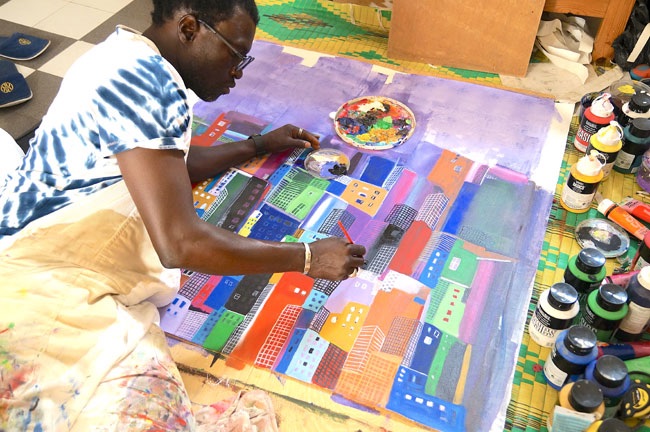Preserve our Arts from the Barbarians

Ndoye Douts recently tiptoed to leave us. He was a fabulous urban painter – of Medina in particular – who used the chaos of the city to create works whose colour reflected the frenzy and energy of working-class neighbourhoods. Ndoye Douts died with almost total indifference, just after a demonstration of the most insane and barbaric violence, and amid the cries of political militants and activists defending all sorts of causes. The press gave scant coverage to the tragic death of a young man of fifty, a major figure of the Dakar School, graduating top of his class in 1999, who exhibited all over the world, receiving honours and recognition. Ndoye Douts was an allegory of the Senegal of yesteryear, of the creative force promoted and defended by Senghor, who propelled, in all informed people concerned with spiritual nourishment, an imagination of fascination for this small country, great for its artistic vitality and the strength of the talent of its sons.
Read the column: Places Die, Men too
Art is still alive in our country, albeit in difficult conditions, given the scant resources allocated to culture, which is a bulwark against ignorance and moral collapse. I am convinced that the crisis we are facing, while requiring a security force to combat seditious and insurrectionary attempts, needs structural responses to be summoned from within the bosom of the arts and culture, which are the most powerful weapons against ignorance. A new cultural springtime is needed to save our country from the abyss promised by politicians, hatemongers, manipulators and theorists of civil war. Senegal must continue to be a sanctuary for artists, artistic freedom, actors and creators, because they are the soul of a nation and produce what time cannot erase. You only have to visit the museums and historic monuments of many countries to see the extent of civilisation, its age, the legacy of previous generations and the tools that history offers to inspire the future. In many parts of the world, this freedom of artists and art is threatened either by authoritarian regimes or by bandits armed with Kalashnikovs whose enemy is knowledge and the libertarian promise that culture offers. In Afghanistan, Syria and Mali, cultural sites and properties of historic importance have been reduced to ashes by false devotees who claim to have a God but leave only hatred, tears, blood and despair in their wake.
Annie Ernaux, Sublime Writing of Shame
There is no simple chauvinism on my part, but a strong conviction: Senegal must remain, and its flame must gush forth for centuries to come, because it is a special country by virtue of its birth. It is a State founded with his « perishable hands » by a man of words, symbols and that transcendence that is so characteristic of poets, which enables them to go beyond the objects and noises of everyday life to titillate the gods, in the heavens, where our vain recriminations and banalities do not reach.
Mentioning Senghor reminds me of how touched I was by the exhibition devoted to him at the Quai Branly Museum in Paris. Throughout the exhibition, it was clear that this country is different because it was early on that creation, the nourishment of the soul, was sacred, and artists were elevated to the rank of demiurges weaving a path for the future.
That is its destiny; strengthened by the legacy of the author of The Liberties and all those – philosophers, painters, dancers, writers, actors, etc. – who ensure that the music of intelligence continues to resonate in the face of the sounds of hatred and barbarism, to ensure that the music of intelligence continues to resonate in the face of the noise of hatred and barbarism.
It is in keeping with this desire to remain a sanctuary for artists that we should be indignant at this small crowd made up of narrow minds, always the same, militants of the same party, that of insult, stupidity and obscurantism, who tried to prevent the singer Waly Seck from making the Paris Dôme vibrate to the rhythms and sounds of our country.
Read the column: Senegal Will Win Again
These are the same people and their predecessors and allies who yesterday censored books, discredited writers, vilified singers and ransacked exhibitions at the Biennale. They crossed every line by burning down the library of the Cheikh Anta Diop University in Dakar, along with seventy years of archives from the same temple of knowledge. I am shocked by the indifference of so many thinkers and teachers in the face of such medieval acts. It astounds me. It terrifies me. If we allow this to happen, tomorrow the enemies of thought will be telling artists here in Senegal when and how to express their art… after certifying their patriotism, good morals and the halal nature of their words. They will arrogate to themselves the right to grant or withhold permission to sing, dance, write or act in the theatre. Those, according to the credible weekly Canard Enchaîné, whose leaders are financed by the Muslim Brotherhood, are a danger to artists, intellectuals and generally to the Republic that they want to bring down. The ideology of this coalition of Islamists, obscurantists, would-be putschists, separatists, populists and extremists of all kinds – sometimes all found in one and the same individual – is a threat to the freedom of artistic creation and to freedom itself.
I’d like to come back to Ndoye Douts, with whom I had the pleasure of collaborating in a group show at the Biennale 2022. I remember him as a talented artist whose inspiration was drawn from cities, in all their disorder and chaos, but also in their emotional fertility and richness. I also remember him as a man of exquisite courtesy and endearing bonhomie. May his soul rest in peace.
By Hamidou ANNE / hamidou.anne@lequotidien.sn

